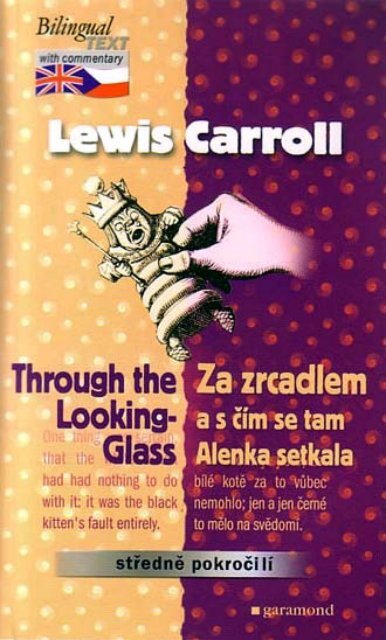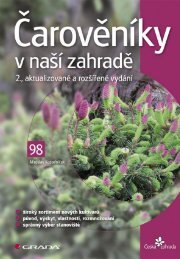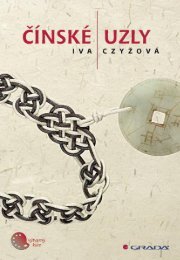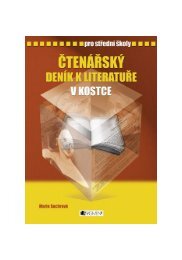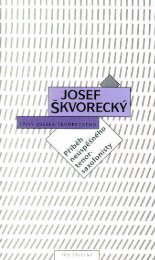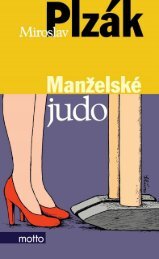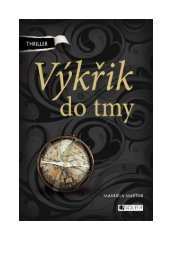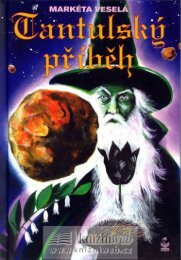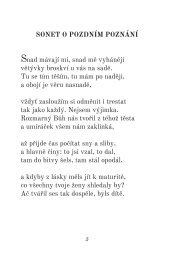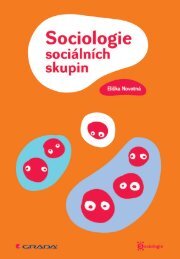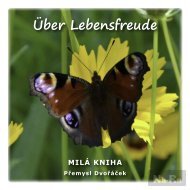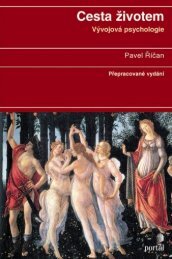Za zrcadlem, a s čím se tam Alenka setkala - Trough the ... - eReading
Za zrcadlem, a s čím se tam Alenka setkala - Trough the ... - eReading
Za zrcadlem, a s čím se tam Alenka setkala - Trough the ... - eReading
Create successful ePaper yourself
Turn your PDF publications into a flip-book with our unique Google optimized e-Paper software.
Z angličtiny přeložili Aloys a Hana Skoumalovi<br />
Translation © Hana Skoumalová, 2003<br />
© Garamond, 2003<br />
ISBN 80-86379-62-0<br />
Lewis Carroll<br />
(1832–1898)<br />
Vlastním jménem Charles Lutwidge Dodgson; svůj<br />
p<strong>se</strong>udonym si vytvořil překladem svých dvou křestních<br />
jmen z latiny zpět do angličtiny a záměnou jejich pořadí.<br />
Od svých 23 let byl Lewis Carroll učitelem matematiky<br />
na Oxfordské univerzitě, kde byl rovněž vysvěcen na<br />
kněze. Jako pedagog ale zvláš neproslul, stejně jako<br />
nikdy nenastoupil kněžskou dráhu: býval prý pln ostychu<br />
před lidmi, k čemuž přispěla i jeho řečová vada.<br />
Údajně ožíval jen v přítomnosti dětí, s nimiž <strong>se</strong> dokázal<br />
uvolnit a v nichž a pro ně nalézal uměleckou inspiraci.<br />
V červenci 1862 <strong>se</strong> s přítelem a třemi malými dcerami<br />
místního děkana vydal na výlet lokou a bavil je příběhem,<br />
jenž nazval Alenčina dobrodružství pod zemí (Alice's<br />
Adventures Underground) a který <strong>se</strong> objevil v tištěné<br />
podobě pod názvem Alice’s Adventures in Wonderland<br />
v roce 1865 a stal <strong>se</strong> záhy velmi populárním. Na knihu<br />
navázalo v roce 1872 pokračování nazvané Through <strong>the</strong><br />
Looking Glass (<strong>Za</strong> <strong>zrcadlem</strong>). Obě prózy znamenaly návrat<br />
fantazie do anglické dětské literatury, která tehdy trpěla<br />
jednak nedostatkem pohádek, jednak viktoriánským<br />
moralizováním, a staly <strong>se</strong> nejen klasikou v anglické básnické<br />
non<strong>se</strong>nsové tradici, ale i trvalou součástí světového<br />
kulturního povědomí. <strong>Za</strong> jeho nejdůležitější matematické<br />
dílo je považována kniha Euclid and his Modern Rivals<br />
(Euklid a jeho moderní rivalové) z roku 1879. Na pomezí<br />
těchto dvou oblastí jeho tvůrčí činnosti <strong>se</strong> pak nacházel<br />
příběh vycházející na pokračování v The Monthly Packet<br />
od roku 1880 nazvaný A Tangled Tale (<strong>Za</strong>motaný<br />
příběh), kde každý z de<strong>se</strong>ti oddílů příběhu zároveň skrývá<br />
algebraický, aritmetický nebo geometrický hlavolam.<br />
Lewis Carroll byl také průkopníkem na poli fotografie; v<br />
r. 1856 si zřídil v Oxfordu fotografický ateliér a vynikl<br />
zejména portréty dětí.
White Pawn (Alice) to play, and win in eleven moves<br />
1. Alice meets R. Q.<br />
2. Alice through Q.’s 3d (by railway) to Q.’s 4th<br />
(Tweedledum and Tweedledee)<br />
3. Alice meets W. Q. (with shawl)<br />
4. Alice to Q.’s 5th (shop, river, shop)<br />
5. Alice to Q.’s 6th (Humpty Dumpty)<br />
6. Alice to Q.’s 7th (forest)<br />
7. W. Kt. takes R. Kt.<br />
8. Alice to Q.’s 8th (coronation)<br />
9. Alice becomes Queen<br />
10. Alice castles (feast)<br />
11. Alice takes R. Q. & wins<br />
1. R. Q. to K. R.’s 4th<br />
2. W. Q. to Q. B.’s 4th (after shawl)<br />
3. W. Q. to Q. B.’s 5th (becomes sheep)<br />
4. W. Q. to K. B.’s 8th (leaves egg on shelf)<br />
5. W. Q. to Q. B.’s 8th (flying from R. Kt.)<br />
6. R. Kt. to K.’s 2nd (ch.)<br />
7. W. Kt. to K. B.’s 5th<br />
8. R.Q. to K.’s sq. (examination)<br />
9. Queens castle<br />
10. W. Q. to Q. R.’s 6th (soup)<br />
Bílý Pěšec (<strong>Alenka</strong>) táhne a vyhraje v jedenácti tazích.<br />
1. <strong>Alenka</strong> potká Č. K.<br />
2. <strong>Alenka</strong> projde d3 (vlakem) na d4<br />
(Tydliták a Tydlitek)<br />
3. <strong>Alenka</strong> potká B. K. (s šálou)<br />
4. <strong>Alenka</strong> na d5 (krám, řeka, krám)<br />
5. <strong>Alenka</strong> na d6 (Valihrach)<br />
6. <strong>Alenka</strong> na d7 (les)<br />
7. B. J. bere Č. J.<br />
8. <strong>Alenka</strong> na d8 (korunovace)<br />
9. <strong>Alenka</strong> Královnou<br />
10. <strong>Alenka</strong> dělá rošádu (hostina)<br />
11. <strong>Alenka</strong> bere Č. K. a vyhraje<br />
1. Č. K. na h5<br />
2. B. K. na c4 (za šálou)<br />
3. B. K. na c5 (promění <strong>se</strong> v ovci)<br />
4. B. K. na f8 (postaví vejce na pult)<br />
5. B. K. na c8 (utíká před Č. J.)<br />
6. Č. J. na e7 (šach)<br />
7. B. J. naf5<br />
8. Č. K. na e8 (zkouška)<br />
9. Královny dělají rošádu<br />
10. B. K. na a6 (polévka)<br />
4/5
PREFACE<br />
As <strong>the</strong> chess-problem, given on a previous page,<br />
has puzzled some of my readers, it may be well to explain<br />
that it is correctly worked out, so far as <strong>the</strong> moves<br />
are concerned. The alternation of Red and White<br />
is perhaps not so strictly ob<strong>se</strong>rved as it might be, and<br />
<strong>the</strong> ‘castling’ of <strong>the</strong> three Queens is merely a way of<br />
saying that <strong>the</strong>y entered <strong>the</strong> palace: but <strong>the</strong> ‘check’<br />
f <strong>the</strong> White King at move 6, <strong>the</strong> capture of <strong>the</strong> Red<br />
Knight at move 7, and <strong>the</strong> final ‘checkmate’ of <strong>the</strong><br />
Red King, will be found, by any one who will take <strong>the</strong><br />
trouble to <strong>se</strong>t <strong>the</strong> pieces and play <strong>the</strong> moves as directed,<br />
to be strictly in accordance with <strong>the</strong> laws of <strong>the</strong><br />
game.<br />
The new words, in <strong>the</strong> poem Jabberwocky (<strong>se</strong>e<br />
p. 202), have given ri<strong>se</strong> to some differences of opinion<br />
as to <strong>the</strong>ir pronunciation: so it may be well to<br />
give instructions on that point also. Pronounce<br />
‘slithy’ as if it were <strong>the</strong> two words ‘sly, <strong>the</strong>’: make <strong>the</strong><br />
‘g’ hard in ‘gyre’ and ‘gimble’: and pronounce ‘rath’<br />
to rhyme with ‘bath.’<br />
1. as, (conj.): since, becau<strong>se</strong> / (protoûe)<br />
2. explain, (v.): to make clear, to justify / (vysvÏtlit, ujasnit, obh·jit)<br />
3. work out, (v., phrasal): to solve / ((vy)¯eöit)<br />
4. ob<strong>se</strong>rve, (v.): to adhere to, to comply with, to follow, to keep,<br />
ëto ob<strong>se</strong>rve a ruleí, also, ëto ob<strong>se</strong>rve a holidayí / ((do)drûet)<br />
PŘEDMLUVA<br />
Někteří čtenáři si nevěděli rady s šachovou úlohou<br />
na předchozí straně; upozorňuji, že je správná,<br />
pokud jde o tahy. Ale střídání Bílých a Černých<br />
snad není zcela přesné a rošáda tří Královen jen znamená,<br />
že vstoupily do paláce. <strong>Za</strong>to Šach Bílému<br />
Králi v 6. tahu, braní Černého Jezdce v 7. tahu a nakonec<br />
mat Černému Králi je zcela podle šachových<br />
pravidel, jak <strong>se</strong> může přesvědčit každý, kdo si dá<br />
práci postavit figurky a provést tahy podle návodu.<br />
5. merely, (adv.): only, just; <strong>the</strong> related adjective is mere / (pouze,<br />
jen)<br />
6. will be found: a future passive construction / (bude zjiötÏno)<br />
7. in accordance with: following, complying with, according to,<br />
/ (na z·kladÏ, v souladu s)<br />
8. as to: in terms of, when it comes to, in regards to / (co <strong>se</strong> t˝Ëe)<br />
6/7
Looking-Glass Hou<strong>se</strong><br />
ONE thing was certain, that <strong>the</strong> white kitten had had<br />
nothing to do with it: – it was <strong>the</strong> black kitten’s fault 1<br />
entirely. For <strong>the</strong> white kitten had been having its face<br />
washed by <strong>the</strong> old cat for <strong>the</strong> last quarter of an hour<br />
(and bearing it pretty well, considering); so you <strong>se</strong>e<br />
that it couldn’t have had any hand in <strong>the</strong> mischief 2 .<br />
The way Dinah washed her children’s faces was<br />
this: first she held <strong>the</strong> poor thing down by its ear with<br />
one paw, and <strong>the</strong>n with <strong>the</strong> o<strong>the</strong>r paw she rubbed its<br />
face all over, <strong>the</strong> wrong way, beginning at <strong>the</strong> no<strong>se</strong>:<br />
and just now, as I said, she was hard at work on <strong>the</strong><br />
white kitten, which was lying quite still and trying to<br />
purr 3 – no doubt feeling that it was all meant for its<br />
good.<br />
But <strong>the</strong> black kitten had been finished with earlier<br />
in <strong>the</strong> afternoon, and so, while Alice was sitting curled<br />
4 up in a corner of <strong>the</strong> great arm-chair, half talking<br />
to her<strong>se</strong>lf and half asleep, <strong>the</strong> kitten had been having<br />
a grand game of romps 5 with <strong>the</strong> ball of worsted 6<br />
Alice had been trying to wind up, and had been rolling<br />
it up and down till it had all come undone again;<br />
and <strong>the</strong>re it was, spread over <strong>the</strong> hearthrug 7 , all knots<br />
and tangles, with <strong>the</strong> kitten running after its own tail<br />
in <strong>the</strong> middle.<br />
1. fault, (n.): blame, mistake; in tennis a ball wrongly <strong>se</strong>rved<br />
/ (chyba, vina)<br />
2. mischief, (n.): annoying behavior, source of harm or disturbance<br />
/ (rozpustilost, nezbednost, zlobenÌ)<br />
3. purr, (v.): to make <strong>the</strong> sound of a cat that is satisfied / (p¯Ìst<br />
(o koËce))<br />
Dům za <strong>zrcadlem</strong><br />
TOLIK je jisté, že bílé kotě za to vůbec nemohlo;<br />
– jen a jen černé to mělo na svědomí. Bílé kotě si<br />
totiž už dobré čtvrt hodiny dalo od staré kočky umývat<br />
obličej (a celkem dobře to snášelo); tu nezbednost<br />
tedy ztropit nemohlo, to je jasné.<br />
Takto umývala Micka dětem obličej: popadla<br />
drobečka prackou za uši a druhou prackou mu od<br />
čumáčku počínajíc proti srsti drbala celý obličej;<br />
a jak už j<strong>se</strong>m řekl, zrovna měla v prádle bílé kotě.<br />
To si klidně leželo, a pokud to šlo, vrnělo – nejspíš<br />
si myslelo, že mu to jen prospěje.<br />
Černé kotě si už brzy odpoledne mytí odbylo,<br />
a jak si <strong>tam</strong> <strong>Alenka</strong> schoulená v koutku lenošky trochu<br />
broukala a trochu podřimovala, ve<strong>se</strong>le skotačilo<br />
s jejím klubkem vlny a tak dlouho si s ním <strong>se</strong>m <strong>tam</strong><br />
kutálelo, až je celé rozmotalo; zmuchlaná a zauzlovaná<br />
vlna byla roztahaná po rohožce a uprostřed <strong>se</strong><br />
kotě honilo za svým ocáskem.<br />
4. curl, (v.): to make a spiral or curved shape / ((s)toËit <strong>se</strong>)<br />
5. romp, (v.): to play wildly, to run joyfully / (dov·dÏt, skotaËit)<br />
6. worsted, (n.): woolen yarn (i.e. thread) / (vlnÏnÈ vl·kno)<br />
7. hearthrug; hearth, (n.): a part of <strong>the</strong> floor in front of a fireplace;<br />
rug, (n): a short and narrow piece of carpet / (kobereËek, podloûka<br />
u krbu)<br />
8/9
‘Oh, you wicked wicked little thing!’ cried Alice,<br />
catching up <strong>the</strong> kitten, and giving it a little kiss to<br />
make it understand that it was in disgrace 1 . ‘Really,<br />
Dinah ought to have taught you better manners! You<br />
ought, Dinah, you know you ought!’ she added, looking<br />
reproachfully 2 at <strong>the</strong> old cat, and speaking in as<br />
cross 3 a voice as she could manage – and <strong>the</strong>n she<br />
scrambled 4 back into <strong>the</strong> arm-chair, taking <strong>the</strong> kitten<br />
and <strong>the</strong> worsted with her, and began winding 5 up <strong>the</strong><br />
ball again. But she didn’t get on very fast, as she was<br />
talking all <strong>the</strong> time, sometimes to <strong>the</strong> kitten, and sometimes<br />
to her<strong>se</strong>lf. Kitty sat very demurely 6 on her<br />
knee, pretending 7 to watch <strong>the</strong> progress of <strong>the</strong> winding,<br />
and now and <strong>the</strong>n putting out one paw and gently<br />
touching <strong>the</strong> ball, as if it would be glad to help if<br />
it might.<br />
‘Do you know what to-morrow is, Kitty?’ Alice began.<br />
‘You’d have gues<strong>se</strong>d if you’d been up in <strong>the</strong> window<br />
with me – only Dinah was making you tidy, so<br />
you couldn’t. I was watching <strong>the</strong> boys getting in sticks<br />
for <strong>the</strong> bonfire – and it wants plenty of sticks, Kitty!<br />
Only it got so cold, and it snowed so, <strong>the</strong>y had to leave<br />
off. Never mind, Kitty, we’ll go and <strong>se</strong>e <strong>the</strong> bonfire<br />
to-morrow.’ Here Alice wound two or three turns<br />
of <strong>the</strong> worsted round <strong>the</strong> kitten’s neck, just to <strong>se</strong>e how<br />
it would look: this led to a scramble, in which <strong>the</strong> ball<br />
rolled down upon <strong>the</strong> floor, and yards and yards of it<br />
got unwound again.<br />
1. disgrace, (n.): <strong>the</strong> condition of being strongly disapproved / (nemilost)<br />
2. reproachfully, (adv.); reproach, (v.; n.): blame, scold(ing)<br />
/ (hubovat, k·rat)<br />
3. cross, (adj.): angry, out of temper, disapproving / (rozzloben˝,<br />
rozËilen˝)<br />
„Ach ty nezbedo,“ spustila na ně <strong>Alenka</strong>, popadla<br />
je, a aby vědělo, že je u ní v nemilosti, vlepila<br />
mu hubičku.<br />
„Micka by tě věru měla naučit způsobům. To bys<br />
měla, Micko, však ty víš!“ <strong>Za</strong>hleděla <strong>se</strong> káravě na<br />
starou kočku a mluvila tak rozezleně, jak to jen dovedla<br />
– potom si vlezla zpátky do lenošky i s kotětem<br />
a s vlnou a znovu navíjela klubko. Ale moc<br />
rychle jí to nešlo, protože přitom pořád mluvila bu<br />
s kotětem, nebo sama <strong>se</strong> <strong>se</strong>bou. Katka jí způsobně<br />
<strong>se</strong>děla na koleně, naoko sledovala navíjení a občas<br />
vystrčila pracku a zlehka chňapla po klubku, jako by<br />
měla chu pomáhat.<br />
„Víš ty, Katko, co je zítra?“ spustila <strong>Alenka</strong>.<br />
„Mělas být <strong>se</strong> mnou u okna, hned bys to uhodla –<br />
jenže to nešlo, Micka tě zrovna upravovala. Dívala<br />
j<strong>se</strong>m <strong>se</strong> na kluky, snášeli polínka na ohníček a ten,<br />
Katko, spotřebuje nějakých polínek. Ale byla taková<br />
zima a taková chumelenice, že toho mu<strong>se</strong>li nechat.<br />
Nic si z toho, Katko, nedělej, však <strong>se</strong> zítra na<br />
ohníček podíváme.“ A tu <strong>Alenka</strong> omotala kotěti vlnu<br />
párkrát kolem krku, jak mu to bude slušet. Nastala<br />
tahanice, klubko <strong>se</strong> skutálelo na zem a sáhodlouhý<br />
kus <strong>se</strong> zas rozmotal.<br />
4. scramble, (v.): crawl, climb / (lÈzt, öplhat ökr·bat <strong>se</strong> nÏkam)<br />
5. wind, (v.): to twist around , coil, wrap; note <strong>the</strong> difference<br />
in pronunciation between wind (n.), /wind/ and wind<br />
(v.) /waind/ /waind/ (namotat, ovinout)<br />
6. demure, (adj.): quiet, re<strong>se</strong>rved / (v·ûn·, rezervovan·)<br />
7. pretend, (v.): to make as if something that you know is not true<br />
or real was true or real / (p¯edstÌrat)<br />
10/11
‘Do you know, I was so angry, Kitty,’ Alice went<br />
on as soon as <strong>the</strong>y were comfortably <strong>se</strong>ttled again,<br />
‘when I saw all <strong>the</strong> mischief you had been doing,<br />
I was very nearly opening <strong>the</strong> window, and putting<br />
you out into <strong>the</strong> snow! And you’d have de<strong>se</strong>rved 1 it,<br />
you little mischievous darling! What have you got to<br />
say for your<strong>se</strong>lf 2 ? Now don’t interrupt me!’ she went<br />
on, holding up one finger. ‘I’m going to tell you all<br />
your faults. Number one: you squeaked 3 twice while<br />
Dinah was washing your face this morning. Now you<br />
can’t deny 4 it, Kitty: I heard you! What’s that you<br />
say?’ (pretending that <strong>the</strong> kitten was speaking.) ‘Her<br />
paw went into your eye? Well, that’s your fault, for<br />
keeping your eyes open – if you’d shut <strong>the</strong>m tight up,<br />
it wouldn’t have happened 5 . Now don’t make any<br />
more excu<strong>se</strong>s, but listen! Number two: you pulled<br />
Snowdrop away by <strong>the</strong> tail just as I had put down <strong>the</strong><br />
saucer of milk before her! What, you were thirsty,<br />
were you? How do you know she wasn’t thirsty too?<br />
Now for number three: you unwound every bit of <strong>the</strong><br />
worsted while I wasn’t looking!<br />
‘That’s three faults, Kitty, and you’ve not been<br />
punished 6 for any of <strong>the</strong>m yet. You know I’m saving<br />
up all your punishments for Wednesday week – Suppo<strong>se</strong><br />
<strong>the</strong>y had saved up all my punishments!’ she went<br />
on 7, talking more to her<strong>se</strong>lf than <strong>the</strong> kitten. ‘What<br />
1. de<strong>se</strong>rve, (v.): be worthy of, to claim / (zaslouûit si)<br />
2. what have you got to say for your<strong>se</strong>lf : what argument do you<br />
have to defend your<strong>se</strong>lf with / (co mi k tomu ¯ekneö, ËÌm <strong>se</strong> obh·jÌö)<br />
3. squeak, (v.): to make a short thin high-pitched sound or cry<br />
/ (vykviknout)<br />
„Když j<strong>se</strong>m, Katko, viděla, co jsi natropila, měla<br />
j<strong>se</strong>m ti takovou zlost,“ zvolala <strong>Alenka</strong>, jakmile <strong>se</strong><br />
zas uvelebily, „že j<strong>se</strong>m málem otevřela okno a vystrčila<br />
tě na sníh! Však bys to zasloužila, ty lumpíku.<br />
Jakou máš omluvu? Neskákej mi do řeči!“ <strong>Alenka</strong><br />
zvedla prst. „Povím ti, <strong>čím</strong> <strong>se</strong>s provinila. <strong>Za</strong> prvé:<br />
když ti dnes ráno Micka umývala obličej, dvakrát jsi<br />
zapištěla. Jen, Katko, nezapírej, sama j<strong>se</strong>m to slyšela!<br />
Co to říkáš?“ (<strong>Alenka</strong> dělala, jako že kotě mluví.)<br />
„Že ti prackou zajela do oka? <strong>Za</strong> to si můžeš<br />
sama, žes měla oči otevřené. Kdybys je byla pevně<br />
zavřela, tak <strong>se</strong> ti to nestalo. Už <strong>se</strong> nevymlouvej a poslouchej.<br />
<strong>Za</strong> druhé: jen j<strong>se</strong>m přistrčila Sněhulce misku<br />
s mlíkem, hned jsi ji od misky odtáhla za ocas!<br />
Cože, ty jsi měla žízeň? A víš ty, jestli neměla ona<br />
taky žízeň? A za třetí: když j<strong>se</strong>m nekoukala, rozmotala<br />
jsi mi všechnu vlnu!<br />
To jsou, Katko, tři provinění a ani za jedno j<strong>se</strong>m<br />
tě ještě nepotrestala. Všechny ty tvé tresty si schovávám<br />
na příští středu – a co kdyby si tak oni schovávali<br />
moje tresty!“ <strong>Alenka</strong> mluvila spíš k sobě než<br />
ke kotěti, „co by mi tak na konci roku udělali? V tu<br />
4. deny, (v.): refu<strong>se</strong> to admit, say that what was said is not true /<br />
(pop¯Ìt)<br />
5. would not have happened: third conditional, u<strong>se</strong>d for referring<br />
to past actions / (nebylo by (<strong>se</strong>) b˝valo (stalo))<br />
6. punish, (v.): to give penalty to, to make suffer for an offen<strong>se</strong><br />
/ (potrestat)<br />
7. went on; go on (v., phrasal): to continue / (pokraËovat)<br />
12/13
would <strong>the</strong>y do at <strong>the</strong> end of a year? I should be <strong>se</strong>nt<br />
to prison, I suppo<strong>se</strong>, when <strong>the</strong> day came. Or – let me<br />
<strong>se</strong>e – suppo<strong>se</strong> each punishment was to be going without<br />
a dinner: <strong>the</strong>n, when <strong>the</strong> mi<strong>se</strong>rable day came,<br />
I should have to go without fifty dinners at once!<br />
Well, I shouldn’t mind that much! I’d far ra<strong>the</strong>r go<br />
without <strong>the</strong>m than eat <strong>the</strong>m!<br />
‘Do you hear <strong>the</strong> snow against <strong>the</strong> window-panes,<br />
Kitty? How nice and soft it sounds! Just as if some<br />
one was kissing <strong>the</strong> window all over outside. I wonder<br />
if <strong>the</strong> snow loves <strong>the</strong> trees and fields, that it kis<strong>se</strong>s<br />
<strong>the</strong>m so gently 1 ? And <strong>the</strong>n it covers <strong>the</strong>m up<br />
snug 2 , you know, with a white quilt 3 ; and perhaps it<br />
says, ”Go to sleep, darlings, till <strong>the</strong> summer comes<br />
again.” And when <strong>the</strong>y wake up in <strong>the</strong> summer, Kitty,<br />
<strong>the</strong>y dress <strong>the</strong>m<strong>se</strong>lves all in green, and dance about –<br />
whenever 4 <strong>the</strong> wind blows – oh, that’s very pretty!’<br />
cried Alice, dropping 5 <strong>the</strong> ball of worsted to clap 6 her<br />
hands. ‘And I do so wish it was true! I’m sure <strong>the</strong> woods<br />
look sleepy in <strong>the</strong> autumn, when <strong>the</strong> leaves are<br />
getting brown.<br />
‘Kitty, can you play chess? Now, don’t smile, my<br />
dear, I’m asking it <strong>se</strong>riously. Becau<strong>se</strong>, when we were<br />
playing just now, you watched just as if you understood<br />
it: and when I said “Check!” you purred!<br />
Well, it was a nice check, Kitty, and really I might<br />
have won, if it hadn’t been for that nasty 7 Knight, that<br />
1. gently, (adv.): softly, soothingly, not roughly or <strong>se</strong>verely / (jemnÏ)<br />
2. snug, (adj., here adv. instead of snugly): comfortably, warmly<br />
/ (teple, mÏkce, pohodlnÏ)<br />
3. quilt, (n.): a cover made by sowing toge<strong>the</strong>r two pieces of cloth<br />
with padding in between <strong>the</strong>m<br />
4. whenever, (adv.): each and every time, at whatever time (Whenever<br />
I call, she tells me she is busy)/ (kdykoli)<br />
hodinu by mě snad uvrhli do vězení. Nebo by mi třeba<br />
za každé provinění nedali jíst a v tu nešastnou<br />
hodinu by mi pak nedali jíst padesátkrát za <strong>se</strong>bou.<br />
Ale to by mi vůbec nevadilo. Lepší, než kdyby mi<br />
tolikrát jíst dali.<br />
Slyšíš, Katko, jak mete sníh do oken! Ozývá <strong>se</strong> to<br />
tak hezky a tak tlumeně! Jako by někdo zvenku celé<br />
okno líbal. Má snad sníh stromy a pole tak rád, že<br />
je tak něžně líbá? A bílou peřinou je celé přikrývá<br />
a snad jim říká: ,Spěte, miláčci, až do léta.‘ Když <strong>se</strong><br />
potom, Katko, v létě probudí, obléknou si zelené<br />
šaty, a když zafouká vítr, hned <strong>se</strong> roztancují, ach, to<br />
je ti krásné!“ <strong>Alenka</strong> zatleskala a přitom upustila<br />
klubko. „Kdyby to tak byla pravda! Vždy na podzim,<br />
když listí zhnědne, stromy vypadají ospale.<br />
Umíš hrát, Katko, šachy? Nic <strong>se</strong> nesměj, milánku,<br />
ptám <strong>se</strong> tě docela vážně. Jak jsme te hráli, ty <strong>se</strong>s<br />
dívala, jako bys tomu rozuměla, a když j<strong>se</strong>m řekla<br />
,šach‘, tak jsi zavrněla! Byl to, Katko, pěkný šach,<br />
a nebýt toho zlého jezdce, který <strong>se</strong> vetřel mezi mé<br />
figurky, tak j<strong>se</strong>m to jistě vyhrála. Víš co, Katko, bu-<br />
5. drop, (v.): to (let) fall down (In winter, temperatures drop to<br />
30F∞) / (upustit, spadnout)<br />
6. clap her hands: to strike <strong>the</strong> hands toge<strong>the</strong>r in a gesture of approval,<br />
to applaud / (tleskat)<br />
7. nasty, (adj.): unpleasant, rude, disagreeable / (oökliv˝, nep¯Ìjemn˝,<br />
zl˝)<br />
14/15
came wriggling down among my pieces. Kitty, dear,<br />
let’s pretend –’ And here I wish I could tell you half<br />
<strong>the</strong> things Alice u<strong>se</strong>d to 1 say, beginning with her favourite<br />
phra<strong>se</strong> ‘Let’s pretend.’ She had had quite<br />
a long argument with her sister only <strong>the</strong> day before –<br />
all becau<strong>se</strong> Alice had begun with ‘Let’s pretend we’re<br />
kings and queens;’ and her sister, who liked being<br />
very exact, had argued that <strong>the</strong>y couldn’t, becau<strong>se</strong><br />
<strong>the</strong>re were only two of <strong>the</strong>m, and Alice had been reduced<br />
at last to say, ‘Well, you can be one of <strong>the</strong>m<br />
<strong>the</strong>n, and I’ll be all <strong>the</strong> rest.’ And once she had really<br />
frightened her old nur<strong>se</strong> by shouting suddenly in her<br />
ear, ‘Nur<strong>se</strong>! Do 2 let’s pretend that I’m a hungry<br />
hyæna, and you’re a bone!’<br />
But this is taking us away from Alice’s speech to<br />
<strong>the</strong> kitten. ‘Let’s pretend that you’re <strong>the</strong> Red Queen,<br />
Kitty! Do you know, I think if you sat up and folded<br />
your arms, you’d look exactly like her. Now do 2 try,<br />
<strong>the</strong>re’s a dear!’ And Alice got <strong>the</strong> Red Queen off <strong>the</strong><br />
table, and <strong>se</strong>t it up before <strong>the</strong> kitten as a model for it<br />
to imitate: however, <strong>the</strong> thing didn’t succeed, principally<br />
3, Alice said, becau<strong>se</strong> <strong>the</strong> kitten wouldn’t fold 4<br />
its arms properly 5. So, to punish it, she held it up to<br />
<strong>the</strong> Looking-glass, that it might <strong>se</strong>e how sulky 6 it was<br />
– ‘and if you’re not good directly,’ she added, ‘I’ll put<br />
you through into Looking-glass Hou<strong>se</strong>. How would<br />
you like that?<br />
1. u<strong>se</strong>d to say: refers to habitual practice in <strong>the</strong> past / (¯Ìk·vala)<br />
2. do: u<strong>se</strong>d here for emphasis, to make <strong>the</strong> request stronger<br />
3. <strong>the</strong>reís a dear: u<strong>se</strong>d to talk to children or pets / (tak je hodn·)<br />
4. principally, (adv.): mainly, mostly, chiefly / (zejmÈna)<br />
5. fold, (v.): bend and interlace arms (hold toge<strong>the</strong>r one on top<br />
of <strong>the</strong> o<strong>the</strong>r ) / (sloûit; takÈ p¯eloûit)<br />
deme jako –“ Kdybych vám tak mohl vypočítat aspoň<br />
polovinu všeho toho, co u Alenky začínalo jejím<br />
oblíbeným: „Budeme jako.“ Zrovna den předtím<br />
<strong>se</strong> dostaly <strong>se</strong> <strong>se</strong>strou do hádky, a to jen proto, že<br />
<strong>Alenka</strong> zas spustila: „Budeme jako králové a královny,“<br />
a <strong>se</strong>stra, která si potrpěla na přesnost, jí dokazovala,<br />
to že být nemohou, protože jsou jen dvě,<br />
až nakonec <strong>Alenka</strong> slevila: „Dobře, ty budeš dělat<br />
jednu a já ty ostatní.“ A jednou k smrti vylekala starou<br />
chůvu, když jí houkla do ucha: „Náno! Já budu<br />
jako hladová hyena a ty budeš kost!”<br />
Ale tím odbočujeme od toho, co <strong>Alenka</strong> říkala kotěti.<br />
„Ty budeš, Katko, jako Černá Královna! Tak si<br />
myslím, kdyby <strong>se</strong>s rovně posadila a založila ruce,<br />
vypadala bys docela jako ona. Zkus to, bu tak hodná!“<br />
<strong>Alenka</strong> <strong>se</strong>brala ze stolu Černou Královnu a postavila<br />
ji jako předlohu před kotě, ale nepovedlo <strong>se</strong><br />
to, podle Alenky hlavně proto, že kotě nezaložilo<br />
pořádně ruce. <strong>Za</strong> trest je zvedla k zrcadlu, aby <strong>se</strong> na<br />
<strong>se</strong>be podívalo, jak trucuje. – „Jestli hned neposlechneš,“<br />
dodala, „str<strong>čím</strong> tě do domu za <strong>zrcadlem</strong>. Co<br />
bys tomu řekla!<br />
6. properly, (adv.): in a way that is correct, appropriate, or conforming<br />
to etiquette / (spr·vnÏ, po¯·dnÏ)<br />
7. sulky, (adj.): silent and re<strong>se</strong>ntful (feeling bitterness) / (mrzutÈ,<br />
rozmrzelÈ, rozdurdÏnÈ)<br />
16/17
‘Now, if you’ll only attend 1 , Kitty, and not talk so<br />
much, I’ll tell you all my ideas about Looking-glass<br />
Hou<strong>se</strong>. First, <strong>the</strong>re’s <strong>the</strong> room you can <strong>se</strong>e through <strong>the</strong><br />
glass – that’s just <strong>the</strong> same as our drawing-room 2 , only<br />
<strong>the</strong> things go <strong>the</strong> o<strong>the</strong>r way. I can <strong>se</strong>e all of it when<br />
I get upon a chair – all but <strong>the</strong> bit just behind <strong>the</strong> fireplace.<br />
Oh! I do so wish I could <strong>se</strong>e that bit! I want<br />
so much to know whe<strong>the</strong>r <strong>the</strong>y’ve a fire in <strong>the</strong> winter:<br />
you never can tell 3 , you know, unless our fire smokes,<br />
and <strong>the</strong>n smoke comes up in that room too – but<br />
that may be only pretence, just to make it look as if 4<br />
<strong>the</strong>y had a fire. Well <strong>the</strong>n, <strong>the</strong> books are something<br />
like our books, only <strong>the</strong> words go <strong>the</strong> wrong way;<br />
I know that, becau<strong>se</strong> I’ve held up one of our books to<br />
<strong>the</strong> glass, and <strong>the</strong>n <strong>the</strong>y hold up one in <strong>the</strong> o<strong>the</strong>r room.<br />
‘How would you like to live in Looking-glass<br />
Hou<strong>se</strong>, Kitty? I wonder if <strong>the</strong>y’d give you milk in<br />
<strong>the</strong>re? Perhaps Looking-glass milk isn’t good to drink<br />
– But oh, Kitty! now we come to <strong>the</strong> passage 5 . You<br />
can just <strong>se</strong>e a little peep 6 of <strong>the</strong> passage in Lookingglass<br />
Hou<strong>se</strong>, if you leave <strong>the</strong> door of our drawingroom<br />
wide open: and it’s very like our passage as far<br />
as you can <strong>se</strong>e, only you know it may be quite different<br />
on beyond 7 . Oh, Kitty! how nice it would be if<br />
we could only get through into Looking-glass Hou<strong>se</strong>!<br />
I’m sure it’s got, oh! such beautiful things in it!<br />
Let’s pretend <strong>the</strong>re’s a way of getting through into it,<br />
1. attend, (v.): pay attention to / (poslouchat, vnÌmat)<br />
2. drawing-room; drawing room: formal or dated (= old u<strong>se</strong>)<br />
a comfortable room in a hou<strong>se</strong> u<strong>se</strong>d for relaxing or entertaining<br />
guests<br />
3. tell, (v.): find out, make known, discern, I cannot tell if <strong>the</strong> bike<br />
is new or not; it certainly has not been u<strong>se</strong>d much / (urËit, odhadnout,<br />
zjistit, poznat)<br />
Tak dávej, Katko, pozor a nemluv tolik, a já ti povím,<br />
co všecko si o tom domě za <strong>zrcadlem</strong> myslím.<br />
Předně je <strong>tam</strong> pokoj, který je vidět za sklem – je<br />
zrovna takový jako náš salon, jenže je <strong>tam</strong> všecko<br />
naopak. Když si stoupnu na židli, vidím ho celičký,<br />
až na ten kou<strong>se</strong>k za krbem. Ach! Kdybych tak i ten<br />
kou<strong>se</strong>k mohla uvidět! Tak ráda bych věděla, jestli<br />
<strong>tam</strong> v zimě taky topí: to <strong>se</strong> neví, až když <strong>se</strong> kouří<br />
z našeho krbu, a pak <strong>se</strong> kouř valí i v jejich pokoji –<br />
ale možná, že jen tak dělají, jako by <strong>se</strong> i u nich topilo.<br />
Knihy mají skoro jako my, jenže slova jdou<br />
opačným směrem. Vím to, protože j<strong>se</strong>m jednou naši<br />
knihu podržela před <strong>zrcadlem</strong> a oni zas v tom druhém<br />
pokoji podrželi svou.<br />
Jakpak by <strong>se</strong> ti, Katko, líbilo v domě za <strong>zrcadlem</strong>!<br />
Jestlipak by ti <strong>tam</strong> dávali mlíčko! Třeba <strong>se</strong> to mlíčko<br />
v domě za <strong>zrcadlem</strong> nedá ani pít – Ach Katko! Ale<br />
te jsme až u chodby. Když necháš v salonku dveře<br />
dokořán, je té chodby v domě za <strong>zrcadlem</strong> vidět<br />
jenom kousíček; co je vidět, vypadá zrovna jako<br />
naše chodba, jenže <strong>tam</strong> dál je třeba docela jiná. Ach<br />
Katko, kdybychom <strong>se</strong> tak dostaly do domu za <strong>zrcadlem</strong>,<br />
to by bylo hezké!<br />
4. make it look as if: pretend that / (dÏlat (aby to vypadalo) jako<br />
ûe)<br />
5. passage, (n.): corridor, a way that leads from one room to ano<strong>the</strong>r<br />
or outside / (chodba, p¯edsÌÚ)<br />
6. peep, (n.): a short look, glance / (nakouknutÌ)<br />
7. beyond, (adv.): far<strong>the</strong>r away (note <strong>the</strong> difference between behind<br />
(= clo<strong>se</strong> to, on <strong>the</strong> o<strong>the</strong>r side) and beyond (= fur<strong>the</strong>r on <strong>the</strong><br />
o<strong>the</strong>r side) ) / (za)<br />
18/19
somehow, Kitty. Let’s pretend <strong>the</strong> glass has got all<br />
soft like gauze, so that we can get through. Why, 1<br />
it’s turning into a sort of mist 2 now, I declare 3 ! It’ll<br />
be easy enough to get through –’ She was up on <strong>the</strong><br />
chimney-piece while she said this, though she hardly<br />
knew how she had got <strong>the</strong>re. And certainly <strong>the</strong> glass<br />
was beginning to melt 4 away, just like a bright silvery<br />
mist.<br />
In ano<strong>the</strong>r moment Alice was through <strong>the</strong> glass,<br />
and had jumped lightly down into <strong>the</strong> Looking-glass<br />
room. The very first 5 thing she did was to look whe<strong>the</strong>r<br />
<strong>the</strong>re was a fire in <strong>the</strong> fireplace, and she was quite<br />
plea<strong>se</strong>d to find that <strong>the</strong>re was a real one, blazing<br />
away as brightly as <strong>the</strong> one she had left behind. ‘So<br />
I shall be as warm here as I was in <strong>the</strong> old room,’<br />
thought Alice: ‘warmer, in fact, becau<strong>se</strong> <strong>the</strong>re’ll be no<br />
one here to scold me away from <strong>the</strong> fire. Oh, what fun<br />
it’ll be, when <strong>the</strong>y <strong>se</strong>e me through <strong>the</strong> glass in here,<br />
and can’t get at me!’<br />
Then she began looking about and noticed that<br />
what could be <strong>se</strong>en from <strong>the</strong> old room was quite common<br />
and uninteresting, but that all <strong>the</strong> rest was as different<br />
as possible 6. For instance 7, <strong>the</strong> pictures on <strong>the</strong><br />
wall next <strong>the</strong> fire <strong>se</strong>emed to be all alive, and <strong>the</strong> very<br />
clock on <strong>the</strong> chimney-piece (you know you can only<br />
<strong>se</strong>e <strong>the</strong> back of it in <strong>the</strong> Looking-glass) had got <strong>the</strong><br />
face 8 of a little man, and grinned at her.<br />
1. why, (interj.): u<strong>se</strong>d to express mild supri<strong>se</strong> or impatience / (jeje)<br />
2. mist, (n.): a thin fog produced by water ga<strong>the</strong>ring in <strong>the</strong> air right<br />
above ground / (mlha, opar)<br />
3. declare, (v.): announce formally / (prohl·sit)<br />
4. melt, (v.): to change from solid to liquid or to disappear in <strong>the</strong><br />
air / (t·t, rozpl˝vat <strong>se</strong>)<br />
5. very first, (adv.): absolutely, truly / (˙plnÏ, zcela)<br />
Nějak <strong>se</strong> <strong>tam</strong>, Katko, jako dostaneme. Zrcadlo je<br />
jako z poddajného gázu a my jím projdeme.<br />
Opravdu! Te <strong>se</strong> nějak zamžilo. Projdeme jím jako<br />
nic –“ Jen to dořekla, už stála na krbové řím<strong>se</strong>, ani<br />
nevěděla, jak <strong>se</strong> <strong>tam</strong> octla. A zrcadlo <strong>se</strong> opravdu rozplývalo<br />
jako stříbřitá mlha.<br />
Vzápětí byla <strong>Alenka</strong> za <strong>zrcadlem</strong> a lehce <strong>se</strong>skočila<br />
do pokoje za ním. Nejprve <strong>se</strong> koukla, hoří-li<br />
v krbu oheň, a nemálo ji potěšilo, že <strong>tam</strong> plápolá<br />
právě tak jasný oheň jako v pokoji, ze kterého odešla.<br />
„Bude mi tu tak teplo jako v <strong>tam</strong>tom pokoji,“ řekla<br />
si <strong>Alenka</strong>, „ba ještě tepleji, protože mě nikdo nebude<br />
honit od krbu. To bude legrace, až mě tady<br />
přes zrcadlo uvidí a nebudou na mě moct.“<br />
Rozhlížela <strong>se</strong> kolem <strong>se</strong>be a zjistila, že co je vidět<br />
z <strong>tam</strong>toho pokoje, je obyčejné a nezajímavé, zato<br />
ostatek je docela jinačí. Tak hned obrázky na zdi krbu<br />
jako by ožily, a dokonce i hodiny na krbové<br />
řím<strong>se</strong> (v zrcadle, jak víte, je z nich vidět jen zadní<br />
stranu) měly podobu stařečka, který <strong>se</strong> na ni ve<strong>se</strong>le<br />
usmíval.<br />
6. as different as possible: different to <strong>the</strong> highest possible degree,<br />
totally different<br />
7. for instance: for example<br />
8. face: in English, <strong>the</strong> word face is u<strong>se</strong>d for <strong>the</strong> front of an object;<br />
a clock also has a face; this is a play with <strong>the</strong> face of a clock and<br />
face as a part of <strong>the</strong> head of a person<br />
9. grin, (v.): to give a wide smile with <strong>the</strong> teeth showing<br />
20/21
‘They don’t keep this room so tidy as <strong>the</strong> o<strong>the</strong>r,’<br />
Alice thought to her<strong>se</strong>lf, as she noticed <strong>se</strong>veral of <strong>the</strong><br />
chessmen down in <strong>the</strong> hearth among <strong>the</strong> cinders 1 : but<br />
in ano<strong>the</strong>r moment, with a little ‘Oh!’ of surpri<strong>se</strong>, she<br />
was down on her hands and knees watching <strong>the</strong>m. The<br />
chessmen were walking about, two and two!<br />
‘Here are <strong>the</strong> Red King and <strong>the</strong> Red Queen,’ Alice<br />
said (in a whisper, for fear of frightening <strong>the</strong>m 2 ), ‘and<br />
<strong>the</strong>re are <strong>the</strong> White King and <strong>the</strong> White Queen sitting<br />
on <strong>the</strong> edge of <strong>the</strong> shovel 3 – and here are two Castles<br />
walking arm in arm – I don’t think <strong>the</strong>y can hear me,’<br />
she went on, as she put her head clo<strong>se</strong>r down, ‘and<br />
I’m nearly sure <strong>the</strong>y can’t <strong>se</strong>e me. I feel somehow as<br />
if I were 4 invisible –’<br />
Here something began squeaking on <strong>the</strong> table behind<br />
Alice, and made her turn her head just in time to<br />
<strong>se</strong>e one of <strong>the</strong> White Pawns roll over and begin kicking:<br />
she watched it with great curiosity 5 to <strong>se</strong>e what<br />
would happen next.<br />
‘It is <strong>the</strong> voice of my child!’ <strong>the</strong> White Queen cried<br />
out as she rushed past <strong>the</strong> King, so violently 6 that she<br />
knocked him over among <strong>the</strong> cinders. ‘My precious 7<br />
Lily! My imperial kitten!’ and she began scrambling<br />
wildly up <strong>the</strong> side of <strong>the</strong> fender.<br />
1. cinders, (n.): remains of burned coal / (popel, oharky)<br />
2. for fear of frightening <strong>the</strong>m: so that she does not frighten <strong>the</strong>m<br />
3. shovel, (n.): an instrument for lifting, moving and scooping<br />
(here cinders) / (lopat(k)a)<br />
4. I feel as if I were invisible: <strong>se</strong>cond conditional; becau<strong>se</strong> this<br />
is an unreal situation she does not say ìas if I wasÑ (in English<br />
one says If I were you, not If I was you, to give advice, indica-<br />
„V tomhle pokoji tak neuklízejí,“ řekla si <strong>Alenka</strong>,<br />
když zahlédla v krbu mezi škvárou několik šachových<br />
figurek. Ale vzápětí vyjekla samým překvapením,<br />
přidřepla k nim a prohlížela si je. Figurky <strong>se</strong><br />
procházely v párech!<br />
„Tady je Černý Král s Černou Královnou,“ řekla<br />
<strong>Alenka</strong> (ale šeptem, aby je nepolekala), „a <strong>tam</strong>hle<br />
<strong>se</strong>dí na lopatce Bílý Král s Bílou Královnou a tady<br />
<strong>se</strong> zas procházejí zavěšeny do <strong>se</strong>be dvě Věže – myslím,<br />
že mě neslyší,“ sklonila hlavu až k nim, „a docela<br />
jistě mě nevidí. Připadám si neviditelná –“<br />
Vtom na stole něco zapištělo, <strong>Alenka</strong> <strong>se</strong> otočila<br />
a ještě zahlédla, jak <strong>se</strong> jeden Bílý Pěšec svalil a jak<br />
kolem <strong>se</strong>be kope. Zvědavě <strong>se</strong> dívala, co bude dál.<br />
„To křičí mé dítě,“ zvolala Bílá Královna a tak<br />
prudce <strong>se</strong> rozběhla, až Krále porazila do popela.<br />
„Má zlatá Lilinko! Má královská kočičko!“ A o překot<br />
<strong>se</strong> šplhala po mřížce.<br />
ting <strong>the</strong> impossibility of becoming <strong>the</strong> o<strong>the</strong>r person) / (jako bych<br />
byla neviditeln·)<br />
5. curiosity, (n.): eagerness to know, <strong>the</strong> desire to learn, asking<br />
a lot / (zvÏdavost, zvÌdavost)<br />
6. violently, (adv.): with force and/or emotion, passion / (silnÏ,<br />
mocnÏ)<br />
7. precious, (adj.): dear, beloved / (drah·, milovan·)<br />
22/23
‘Imperial fiddlestick 1 !’ said <strong>the</strong> King, rubbing his<br />
no<strong>se</strong>, which had been hurt 2 by <strong>the</strong> fall. He had a right 3<br />
to be a little annoyed 4 with <strong>the</strong> Queen, for he was covered<br />
with ashes from head to foot.<br />
Alice was very anxious 5 to be of u<strong>se</strong> 6 , and, as <strong>the</strong><br />
poor little Lily was nearly screaming her<strong>se</strong>lf into<br />
a fit 7 , she hastily picked up <strong>the</strong> Queen and <strong>se</strong>t her on<br />
<strong>the</strong> table by <strong>the</strong> side of her noisy little daughter.<br />
The Queen gasped 8 , and sat down: <strong>the</strong> rapid journey<br />
through <strong>the</strong> air had quite taken away her breath<br />
and for a minute or two she could do nothing but hug 9<br />
<strong>the</strong> little Lily in silence. As soon as she had recovered<br />
her breath a little, she called out to <strong>the</strong> White<br />
King, who was sitting sulkily among <strong>the</strong> ashes, ‘Mind<br />
<strong>the</strong> volcano!’<br />
‘What volcano?’ said <strong>the</strong> King, looking up anxiously<br />
into <strong>the</strong> fire, as if he thought that was <strong>the</strong> most likely<br />
place to find one.<br />
‘Blew – me – up,’ panted <strong>the</strong> Queen, who was still<br />
a little out of breath. ‘Mind you come up – <strong>the</strong> regular<br />
way — don’t get blown up!’<br />
Alice watched <strong>the</strong> White King as he slowly struggled<br />
up from bar to bar 10 , till at last she said, ‘Why,<br />
you’ll be hours and hours getting to <strong>the</strong> table, at that<br />
rate. I’d far better help you, hadn’t I?’ But <strong>the</strong> King<br />
took no notice of <strong>the</strong> question: it was quite clear that<br />
he could nei<strong>the</strong>r hear her nor <strong>se</strong>e her.<br />
1. fiddlestick, (n.): an instrument for playing <strong>the</strong> violin (= <strong>the</strong> fiddle);<br />
fiddlesticks: a dated exlamation showing disagreement;<br />
non<strong>se</strong>n<strong>se</strong>! / (smyËec / nesmysl, hloupost)<br />
2. hurt, (adj.): damaged, injured, suffering pain / (poökozen, zranÏn)<br />
3. right, (n.): a claim that one has to be treated in a fair, legal way<br />
/ (pr·vo)<br />
4. annoyed, (adj.): feeling mild anger / (otr·ven˝, nazloben˝)<br />
5. anxious, (adj.): eager, desirous / (dychtiv·, natÏöen·)<br />
„Královské Tintilivantili,“ řekl Král a mnul si<br />
nos, při pádu si ho totiž odřel. Bodej by <strong>se</strong> trochu<br />
nedurdil, byl od hlavy až k patě samý popel. Chudák<br />
Lilinka vřískala, jako by ji na nože bral. <strong>Alenka</strong><br />
z upřímné touhy pomoci Královnu popadla a postavila<br />
ji na stůl vedle uřvané dcery.<br />
Královna <strong>se</strong>děla a popadala dech. Po tom prudkém<br />
letu povětřím chvíli nemohla vydechnout a jen<br />
k sobě mlčky tiskla Lilinku; jakmile zas vydechla,<br />
křikla dolů na Bílého Krále, který <strong>se</strong>děl nadurděně<br />
v popelu: „Pozor na sopku!“<br />
„Jakou sopku?“ Král <strong>se</strong> koukl starostlivě do ohně,<br />
<strong>tam</strong> že ji snad nejspíš uhlídá.<br />
„Mě vymrštila nahoru!“ vyrážela zajíkavě Královna.<br />
„Hle <strong>se</strong> dostat nahoru – obvyklou cestou –<br />
aby tě to taky nevymrštilo!“<br />
<strong>Alenka</strong> <strong>se</strong> dívala, jak <strong>se</strong> Bílý Král drápe z jedné<br />
příčky na druhou, a nakonec řekla: „Takhle polezeš<br />
na stůl kolik hodin. Neměla bych ti raději pomoct?“<br />
Král jí na to nic neříkal, bylo vidět, že ji neslyší a nevidí.<br />
6. be of u<strong>se</strong>: be u<strong>se</strong>ful, helpful / (k uûitku, n·pomocna)<br />
7. fit, (n.): an attack, an outburst / (z·chvat, v˝buch )<br />
8. gasp, (v.): to draw breath with open mouth heavily like when<br />
one is surpri<strong>se</strong>d or very tired / (d˝chat tÏûce, popadat dech, mohutnÏ<br />
vdechnout<br />
9. hug,(v.): to put arms around as a sign of clo<strong>se</strong>ness or love / (obejmout)<br />
10. bar, (n.): a long straight piece of material (a candy bar is a sweet<br />
product like Deli, Mars or Snickers, a bar code is a system of lines<br />
u<strong>se</strong>d to identify a product) / (tyËka, p¯ÌËka, tyËinka)<br />
24/25
So Alice picked him up very gently, and lifted him<br />
across more slowly than she had lifted <strong>the</strong> Queen, that<br />
she mightn’t take his breath away: but, before she put<br />
him on <strong>the</strong> table, she thought she might as well dust 1<br />
him a little, he was so covered with ashes.<br />
She said afterwards that she had never <strong>se</strong>en in all<br />
her life such a face as <strong>the</strong> King made 2 , when he<br />
found 3 him<strong>se</strong>lf held in <strong>the</strong> air by an invisible hand,<br />
and being dusted: he was far too much astonished 4 to<br />
cry out, but his eyes and his mouth went on getting<br />
larger and larger, and rounder and rounder, till her<br />
hand shook so with laughing that she nearly let him<br />
drop upon <strong>the</strong> floor.<br />
‘Oh! plea<strong>se</strong> don’t make such faces, my dear!’ she<br />
cried out, quite forgetting that <strong>the</strong> King couldn’t hear<br />
her. ‘You make me laugh so that I can hardly hold<br />
you! And don’t keep your mouth so wide open! All<br />
<strong>the</strong> ashes will get into it – <strong>the</strong>re, now I think you’re<br />
tidy enough!’ she added, as she smoo<strong>the</strong>d 5 his hair,<br />
and <strong>se</strong>t him upon <strong>the</strong> table near <strong>the</strong> Queen.<br />
The King immediately 6 fell flat on his back, and<br />
lay perfectly 7 still: and Alice was a little alarmed at<br />
what she had done, and went round <strong>the</strong> room to <strong>se</strong>e if<br />
she could find any water to throw over him. However,<br />
she could find nothing but a bottle of ink, and<br />
when she got back with it she found he had recovered<br />
8, and he and <strong>the</strong> Queen were talking toge<strong>the</strong>r in<br />
a frightened whisper 9 – so low, that Alice could hardly<br />
hear what <strong>the</strong>y said.<br />
1. dust, (v.): to rid of dust (fine particles blown by wind or lying<br />
on <strong>the</strong> surface of objects) / (opr·öit)<br />
2. make a face: make a grimace / (pitvo¯it <strong>se</strong>)<br />
3. found him<strong>se</strong>lf + passive: was or got in <strong>the</strong> situation, state or action<br />
4. astonished, (adj.): amazed, surpri<strong>se</strong>d / (uûasl˝, udiven˝)<br />
5. smooth, (v.): to flaten, to remove irregularities / (uhladit)<br />
<strong>Alenka</strong> ho tedy šetrně <strong>se</strong>brala a zdvihla ho nahoru<br />
pomaleji než Královnu, aby mu nevyrazila dech, ale<br />
než ho postavila na stůl, řekla si, že ho trochu opráší,<br />
byl celý od popela.<br />
Tak <strong>se</strong> před ní jakživ nikdo netvářil, řekla si později<br />
kolikrát, jako Král, když ho neviditelná ruka držela<br />
v povětří a oprašovala. Byl tak užaslý, že ani<br />
nezaječel, jenom poulil oči a otvíral ústa víc a víc<br />
a víc, div ho nepustila na zem, jak <strong>se</strong> jí smíchem třásla<br />
ruka.<br />
„Ale prosím tě, jen <strong>se</strong> tak neškleb!“ vyprskla<br />
<strong>Alenka</strong> a nadobro zapomněla, že ji Král neslyší.<br />
„Tak jsi mě rozesmál, že tě sotva udržím! A neotvírej<br />
ústa tak dokořán! Nalítá ti <strong>tam</strong> popel – tak te už<br />
jsi zas čistý!“ přičísla mu vlasy a opatrně ho postavila<br />
na stůl ke Královně.<br />
Král padl naznak a zůstal bez hnutí ležet. <strong>Alenka</strong><br />
<strong>se</strong> lekla, co to udělala, a po celém pokoji hledala vodu,<br />
aby ho pokropila. Ale našla jenom lahvičku s inkoustem,<br />
a když <strong>se</strong> s ní vrátila, Král už přišel k sobě<br />
a zděšeně si s Královnou šeptal – jenže tak potichu,<br />
že <strong>Alenka</strong> skoro neslyšela, co si říkají.<br />
6. immediately, (adv.): right away, at once / (hned, okamûitÏ)<br />
7. perfectly, (adv.): completely / (zcela)<br />
8. recover, (v.): to get back health or strength / (zotavit <strong>se</strong>)<br />
9. whisper, (n.): speech in soft tones, in order niot to be heard<br />
or not to disturb o<strong>the</strong>rs / (öepot)<br />
26/27
‘Sit up a little more stiffly, dear!’ Alice cried with<br />
a merry laugh, ‘And curt<strong>se</strong>y while you’re thinking<br />
what to – what to purr. It saves time, remember!’ And<br />
she caught it up and gave it one little kiss, ‘just in honour<br />
of its having been a Red Queen.’<br />
‘Snowdrop, my pet!’ she went on, looking over her<br />
shoulder at <strong>the</strong> White Kitten, which was still patiently<br />
undergoing 1 its toilet, ‘when will Dinah have finished<br />
2 with your White Majesty, I wonder? That<br />
must be <strong>the</strong> reason you were so untidy in my – dream<br />
– Dinah! Do you know that you’re scrubbing 3 a White<br />
Queen? Really, it’s most disrespectful of you!<br />
‘And what did Dinah turn to, I wonder?’ she prattled<br />
4 on, as she <strong>se</strong>ttled comfortably down, with one<br />
elbow 5 on <strong>the</strong> rug, and her chin in her hand, to watch<br />
<strong>the</strong> kittens. ‘Tell me, Dinah, did you turn to 6 Humpty<br />
Dumpty? I think you did – however, you’d better not<br />
mention it to your friends just yet, for I’m not sure.<br />
‘By <strong>the</strong> way, Kitty, if only you’d been really with<br />
me in my dream, <strong>the</strong>re was one thing you would have<br />
enjoyed – I had such a quantity of poetry said to me,<br />
all about fishes! To-morrow morning you shall have<br />
a real treat. All <strong>the</strong> time you’re eating your breakfast,<br />
I’ll repeat “The Walrus and <strong>the</strong> Carpenter” to you;<br />
and <strong>the</strong>n you can make believe it’s oysters, dear!<br />
1. undergo, (v.): experience, endure / (podstoupit, sn·öet)<br />
2. when will ... have finished: future perfect, indicates action that<br />
by a point in <strong>the</strong> future will definitely be finished<br />
3. scrub, (v.): to clean, people usually with a hard brush and water,<br />
a cat with <strong>the</strong> tongue / (drhnout, m˝t)<br />
„Se, milánku, zpříma!“ zasmála <strong>se</strong> rozpustile<br />
<strong>Alenka</strong>. „A pokloň <strong>se</strong>, když myslíš na to, co – co zavrníš.<br />
Ušetří <strong>se</strong> tím čas!“ Popadla ji do náručí a vlepila<br />
jí hubičku, „to na počest toho, žes byla Černou<br />
Královnou.“<br />
„Sněhulko, ty můj mazlíku!“ ohlédla <strong>se</strong> přes rameno<br />
po Bílém Kotěti, které <strong>se</strong> pořád trpělivě dalo<br />
upravovat, „kdypak už bude Micka hotova s Vaším<br />
Bílým Veličenstvem? Snad proto jsi byla v mém snu<br />
tak rozcuchaná. – Micko! Jestlipak víš, že drbeš Bílou<br />
Královnu? Že k ní můžeš být tak neuctivá, to <strong>se</strong><br />
divím!“<br />
„A v copak <strong>se</strong> asi proměnila Micka?“ žvatlala si<br />
a loktem pohodlně opřená o rohožku a bradu v dlaních<br />
pozorovala koata. „Pověz mi, Micko, neproměnila<br />
ty <strong>se</strong>s ve Valihracha? Tak <strong>se</strong> mi zdá, že ano<br />
– ale jistě to nevím, tak o tom zatím před známými<br />
nemluv.<br />
Ostatně být tak, Katko, v mém snu doopravdy <strong>se</strong><br />
mnou, to by sis užila – těch básniček, co mi odříkávali,<br />
a všechny byly o rybách! Zítra ráno <strong>se</strong> poměješ.<br />
K snídani ti budu odříkávat ,Mrože a tesaře‘.<br />
A ty potom můžeš, milánku, dělat, jako že jsou to<br />
ústřice!<br />
4. prattle, (v.): to talk childishly/ (tlachat, ûvatlat)<br />
5. elbow, (n.): <strong>the</strong> joint of <strong>the</strong> arm between <strong>the</strong> wrist and <strong>the</strong> shoulder<br />
/ (loket)<br />
6. turn to: change into<br />
300/301
‘Now, Kitty, let’s consider who it was that dreamed<br />
it all. This is a <strong>se</strong>rious question, my dear, and you<br />
should not go on licking your paw like that – as if Dinah<br />
hadn’t washed you this morning! You <strong>se</strong>e, Kitty,<br />
it must have been ei<strong>the</strong>r me or <strong>the</strong> Red King. He was<br />
part of my dream, of cour<strong>se</strong> – but <strong>the</strong>n I was part of<br />
his dream, too! Was it <strong>the</strong> Red King, Kitty? You were<br />
his wife, my dear, so you ought to know – Oh, Kitty,<br />
do help to <strong>se</strong>ttle 1 it! I’m sure your paw can wait!’ But<br />
<strong>the</strong> provoking kitten only began on <strong>the</strong> o<strong>the</strong>r paw, and<br />
pretended it hadn’t heard <strong>the</strong> question.<br />
Which do you think it was?<br />
1. <strong>se</strong>ttle, (v.): solve, conclude / (rozluötit, vy¯eöit)<br />
Te <strong>se</strong>, Katko, zamysleme, komu <strong>se</strong> to vlastně<br />
zdálo. Je to, milánku, vážná věc, a neolizuj si pořád<br />
tu pracku – copak ti ji Micka dnes ráno neumyla?<br />
To máš tak, Katko, bu <strong>se</strong> to zdálo mně, nebo Černému<br />
Královi. On ovšem patřil do mého snu – jenže<br />
já zas j<strong>se</strong>m patřila do jeho! A byl to, Katko, Černý<br />
Král? Ty to budeš, milánku, vědět, bylas jeho ženou<br />
– Tak Katko, pomoz mi to rozluštit. Ta pracka počká!“<br />
Ale to protivné kotě si olizovalo zas druhou<br />
pracku a dělalo, že neslyší.<br />
Komu <strong>se</strong> to zdálo, co myslíte?<br />
302/303
CONTENTS<br />
Preface . . . . . . . . . . . . . . . . . . . . . . . . . . . . . . . . . 6<br />
Looking-Glass Hou<strong>se</strong> . . . . . . . . . . . . . . . . . . . . . 8<br />
The Garden of Live Flowers . . . . . . . . . . . . . . . 40<br />
Looking-Glass In<strong>se</strong>cts . . . . . . . . . . . . . . . . . . . . 64<br />
Tweedledum and Tweedledee . . . . . . . . . . . . . . 90<br />
Wool and Water. . . . . . . . . . . . . . . . . . . . . . . . 124<br />
Humpty Dumpty . . . . . . . . . . . . . . . . . . . . . . . 154<br />
The Lion and <strong>the</strong> Unicorn . . . . . . . . . . . . . . . . 180<br />
‘It’s my own Invention’. . . . . . . . . . . . . . . . . . 214<br />
Queen Alice . . . . . . . . . . . . . . . . . . . . . . . . . . . 254<br />
Shaking . . . . . . . . . . . . . . . . . . . . . . . . . . . . . . 294<br />
Waking. . . . . . . . . . . . . . . . . . . . . . . . . . . . . . . 296<br />
Which Dreamed it? . . . . . . . . . . . . . . . . . . . . . 298<br />
OBSAH<br />
Předmluva . . . . . . . . . . . . . . . . . . . . . . . . . . . . . 7<br />
Dům za <strong>zrcadlem</strong>. . . . . . . . . . . . . . . . . . . . . . . . 9<br />
<strong>Za</strong>hrada živých květin . . . . . . . . . . . . . . . . . . . 41<br />
Hmyz za <strong>zrcadlem</strong>. . . . . . . . . . . . . . . . . . . . . . 65<br />
Tydliták a Tydlitek . . . . . . . . . . . . . . . . . . . . . 91<br />
Vlna a voda . . . . . . . . . . . . . . . . . . . . . . . . . . 125<br />
Valihrach . . . . . . . . . . . . . . . . . . . . . . . . . . . . 155<br />
Lev a jednorožec . . . . . . . . . . . . . . . . . . . . . . 189<br />
„Je to můj vynález“ . . . . . . . . . . . . . . . . . . . . 215<br />
Královna <strong>Alenka</strong> . . . . . . . . . . . . . . . . . . . . . . 255<br />
Tře<strong>se</strong>ní. . . . . . . . . . . . . . . . . . . . . . . . . . . . . . 295<br />
Probuzení. . . . . . . . . . . . . . . . . . . . . . . . . . . . 297<br />
Komu <strong>se</strong> to zdálo?. . . . . . . . . . . . . . . . . . . . . 299
Lewis Carroll<br />
Through <strong>the</strong> looking glass<br />
<strong>Za</strong> <strong>zrcadlem</strong>, a s <strong>čím</strong> <strong>se</strong> <strong>tam</strong> <strong>Alenka</strong> <strong>se</strong>tkala<br />
Z anglického originálu<br />
Through <strong>the</strong> Looking Glass<br />
přeložili Aloys a Hana Skoumalovi<br />
Jazykový komentář a redakce Jiřina <strong>Za</strong>chová<br />
Obálka a grafická úprava Dorotea S<strong>tam</strong>enova<br />
Technická redakce Renáta Šmatová<br />
Sazba www.studioiq.cz<br />
Vytiskl Protisk České Budějovice<br />
Vydalo nakladatelství Garamond<br />
jako svou 73. publikaci<br />
Praha 2004<br />
Stran 306<br />
www.e-garamond.cz


